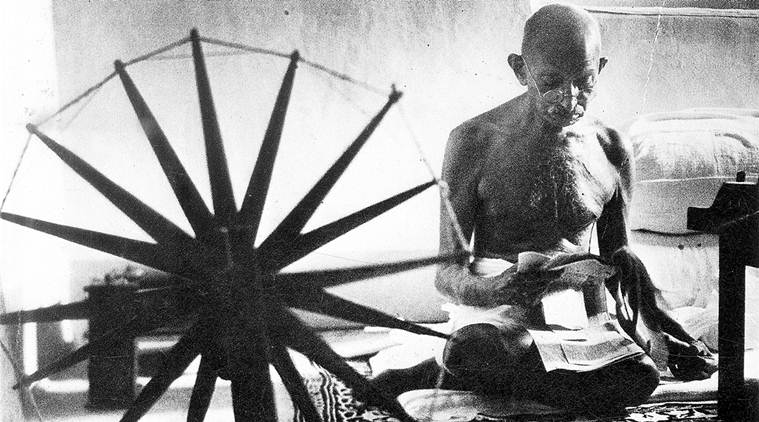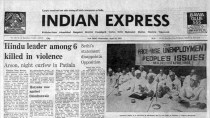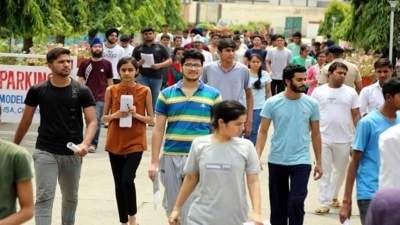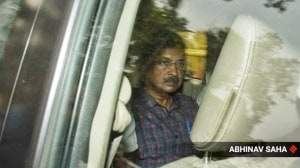- India
- International
How Gandhian idea of non-violence is shaping political struggle in Spain
As the Gandhian moment of Catalonia is showing the world, democracy is not only about institutions, law-making and carrying on governmental administration by means of popular suffrage and elected officers.
 Gandhi Jayanti 2019: Mahatma Gandhi reading a newspaper. (Express archive photo)
Gandhi Jayanti 2019: Mahatma Gandhi reading a newspaper. (Express archive photo)
Gandhi’s life continues to inspire people around the world. He changed India and the world with his vision of compassion, tolerance and peace. But he was above all an accomplished strategist who throughout his life worked to develop theories and practices that would advance the rights of marginalised groups and oppressed communities around the world. He inspired moral and political leaders such as Martin Luther King Jr., Nelson Mandela, Vaclav Havel, the Dalai Lama, and impacted social and political movements in Latin America, Asia, the Middle East and Europe. Despite the geographic and cultural diversity of these places, nonviolent movements there have exhibited a remarkable similarity to Gandhi’s strategy for checking power and opposing violence. These indicate the practical success of an ethical commitment to norms of political transparency, non-violent negotiation, reconciliation and mutual respect.
Before Gandhi’s satyagraha in India, virtually all modern revolutions had been based on bitterness and violence. The bitterness turned the revolutions bloody and vengeful. Gandhi turned the bitterness and violence of traditional revolutions into the positive power of non-violence. His revolution was not born of hatred and despair, therefore it was not driven by bitterness and violence. Far from being utopian, Gandhi’s idea of ethical politics based on non-violence continues to be the most practical path to democratise liberal democracies that have a tendency to forget their foundational values. This is evident in the non-violent political struggle in Catalonia.
For the Catalans, who have dreamt of independence, disappointment might be real. But must they respond with bitterness, hate and violence? Or should they turn inward in self-defeat and self-pity? Neither, for sure. Because, for those who suffer in a non-violent cause, the most fruitful course is to stand firm and stay hopeful. This is the essence of the Gandhian moment of Catalonia. It is based on moral courage and respect for the otherness of others rather than passive submission to the thermodynamics of power. Cicero said that “freedom is participation in power”. But for Catalans who believe in political autonomy and freedom, this power is no other than the ability to implement the demands of dialogue and justice in Catalonia. It is the moral strength to bring about a revolution of values in Catalonia. In this sense, we are talking about a power of love, not love of power.
According to Martin Luther King, Jr., “Power at its best is love implementing the demands of justice, justice at its best is love correcting everything that stands against love.” Those Catalans who believe in the force of non-violence in bringing about changes in Catalonia cannot and should not advocate the same conscience-less power that they justly abhor in the Spanish police force. It is precisely this moral collision of the power of the powerless Catalans with the immoral power of a powerful sovereignty that constitutes the Gandhian moment of Catalonia. That is why creative dissenters of Catalonia know well that the active way of non-violence is the meaningful conviction that they will stand with it till the end. The subversive sweetness and radical tenderness of Catalan non-violence is not only the re-invigoration of public life in Catalonia, but also a fundamental transformation of the Spanish and European mode of thinking and living democracy.
As the Gandhian moment of Catalonia is showing the world, democracy is not only about institutions, law-making and carrying on governmental administration by means of popular suffrage and elected officers. Democracy is a mode of thinking and a way of life, where violence is tamed and non-violent social and political arrangements replace coercive and oppressive modes of subordinating individuals to the power of a government. There is no reason why the fundamental beliefs and practices of any democracy, either European, American or Asian, which subjugate and humiliate citizens instead of uplifting them, cannot be put into question. In that sense, democracy has to be a committed journey in the direction of humanness, compassion and maturity. It is a transfer of speech and action from oligarchs and plutocrats to everyday people and ordinary citizens.

Two centuries ago, German philosopher Immanuel Kant said enlightenment was human being’s release from “self-incurred tutelage”. It was the process by which human beings could become free of intellectual guardianship, and learn to “dare to think”. Kant believed that this tutelage occurred because of many reasons and aspects, cowardice and complacency among them. In other words, for Kant, as for many of us, being mature is about being independent-minded and morally and intellectually mature. This is where the force of non-violent action resides: It helps people to think not only in terms of political autonomy, but mainly in relation to intellectual and moral independence. Where there is a desire and a unity among citizens of a society to think for themselves and emerge from any form of tutelage, that society is already on the path of independence.
This sense of maturity is at the heart of the Gandhian moment of Catalonia. Gandhi’s satyagraha showed that the truly civilised party in a clash for maturity, autonomy and independence are those who practise non-violence. This is the moral imperative and the intellectual foundation of Catalonia’s political struggle. The line of progress might not be straight in Catalonia, but it is certainly shaping a great spirit of dignity among Catalonians and a sense of respect for Catalonia among those who never believed in the Gandhian moment of Catalonia.
This article first appeared in the print edition on October 2, 2019, under the title ‘Reading Gandhi in Catalonia’. The writer is professor-vice dean, Jindal Global University.
40 Years Ago
EXPRESS OPINION
More Explained
Apr 18: Latest News
- 01
- 02
- 03
- 04
- 05









































